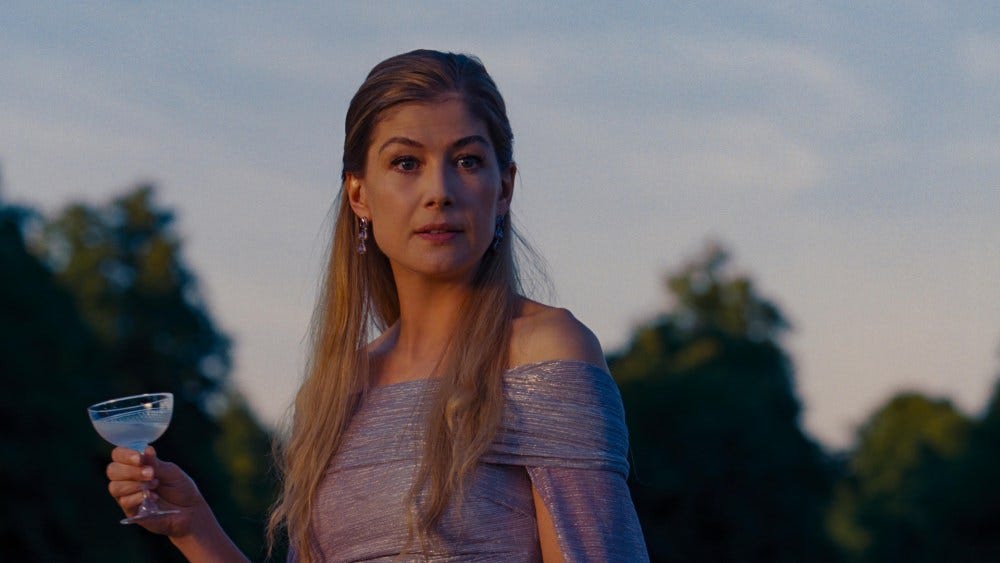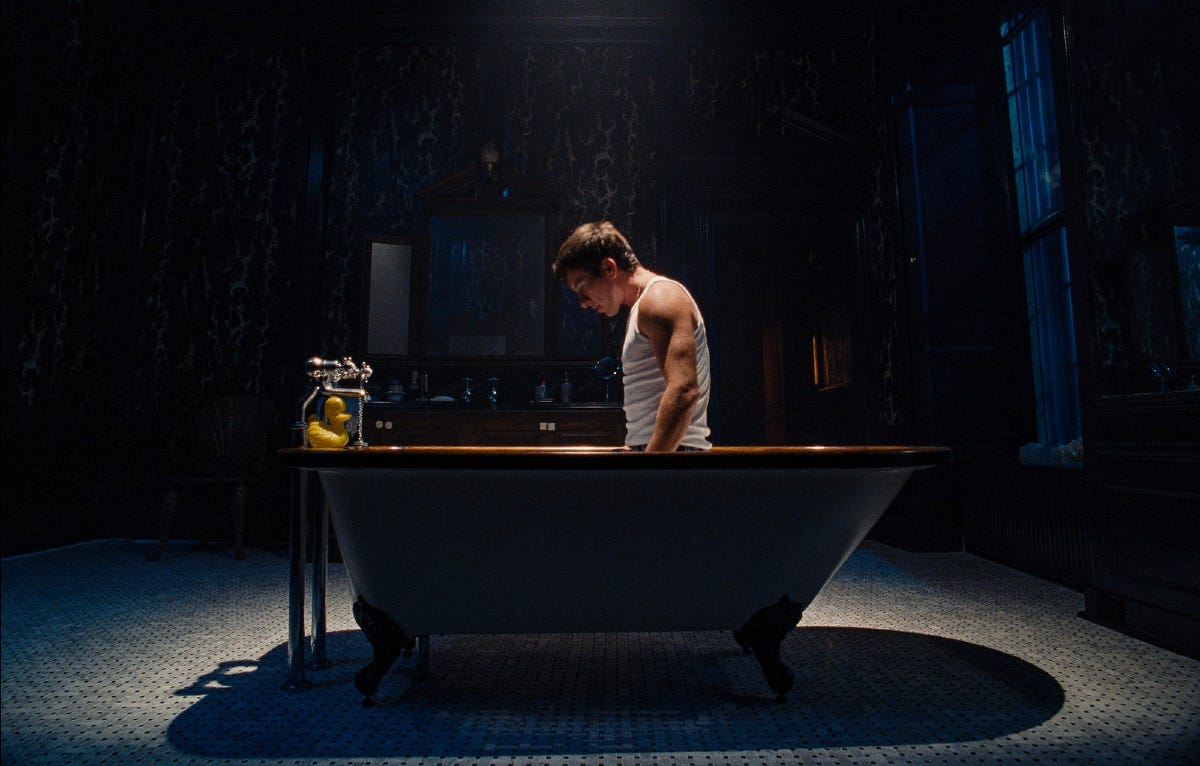“I don’t know if you’ve ever been here: You know the feeling when somebody walks in, and you think to yourself, ‘I know that person’s probably… what’s the word? Trouble.’” — Taylor Swift
She was queueing up her song “I Knew You Were Trouble,” but without context this freshly viral quote could be lifted to describe Saltburn, Emerald Fennell's “polarizing masterpiece,” “stupid in a good way or a bad way?” film that, along with the release of Gypsy Rose Blanchard, has dominated the often-bleak holiday pop culture press cycle and perhaps even driven Ayo Edebiri off Letterboxd. Why? There’s a few factors here. There’s the presence of the “#1 babygirl” Jacob Elordi, the twisted delight of Rosamund Pike chewing scenery, and the lurching undercurrent of homoeroticism. That the film has been perceived as polarizing has made it something everyone has to have a fully formed opinion on, and many feel compelled to share.
I’m not immediately captured by Saltburn in premise or in its final form. Class, desire and obsession are themes I generally gravitate toward but this film, for me, lacked stickiness. Could I argue its lack of merit? It’s not that. It’s that I don’t feel energetically compelled to speak on the film in any capacity. This, for me, is a sign.
I try not to contend with “did I like a thing?” after seeing it. Who cares if I liked it? Instead, I have an informal rubric of questions I ask after I see anything from The Zone of Interest to M3GAN. Did it stay with me? What were the themes? What was the story the writer/director was trying to tell? Was there a larger “about” than just the plot of the film? What outstanding questions do I have? After seeing Saltburn, I found myself less eager to dig into the film and more eager to revisit a film that many were comparing it to: Anthony Minghella’s The Talented Mr. Ripley.
According to Fennell, Ripley was not on the mood board for the film, stating that it wasn’t something she was thinking about. "Obviously Highsmith is one of my absolute favorites, but I think that I was sort of looking more at that British Country House tradition of The Go-Between and that sort of very specific British... sort of Joseph Losey world, where class and power and sex all kind of collide in one specific place."
But the comparisons are inevitable between Tom Ripley (Matt Damon) and Oliver Quick (Barry Keoghan) and their counterparts, Dickie Greenleaf (Jude Law) and Felix Catton (Jacob Elordi).
The comparisons between the two films seem so obvious it's almost reductive to draw the line. But the one many seem keen to zoom in on are the homosexual undertones present in both. Both heavily suggest that their protagonists are not entirely straight, most explicitly evidenced in two bathtub scenes. In The Talented Mr. Ripley, Tom asks Dickie if he can get in the bathtub with him and then stares longingly at Dickie’s naked body when Dickie rejects the request and steps out of the tub to shower instead.
In Saltburn, Oliver peeks in at Felix masturbating in the bathtub and then proceeds to lap up the semen-enriched water as it drains from the tub shortly after Felix leaves.
The latter is shocking because nothing of the sort has ever been done in a film of this wide a release. The closest example I can think of is Oliver eating the peach that Elio masturbated into in Call Me by Your Name. My dear friend Tessa, a film scholar, added “the scene in Crash where I can’t remember who is having sex with Rosanna Arquette and I think they, like, lick her gruesomely scarred up leg.” (It’s James Spader. I Googled.) I suppose we should include Jim fucking the pie in American Pie, too, right? These instances are about desire and submission. In The Talented Mr. Ripley, the scene highlights the ever-expanding gray area of their friendship. Tom finally makes a move, but even Dickie’s rejection can be seen as him further leading Tom on. They’re playing chess (literally!) while Dickie is in the tub. Tom loves Dickie. He admires him. He envies him. He obsesses over him. And in that lingering stare, you start to wonder how far Tom will go to be with him.
Of course we shortly thereafter come to learn if he can’t be with him, he’ll settle for being him. It’s here I have to say that I never found the character of Felix to contain the intrigue or complexity of Dickie.
After finishing Saltburn, in an attempt to conjure intrigue, I tried to zero in on what those that enjoyed the film enjoyed about it. I thought maybe this could uncover some way to watch the film that I had not been able to access. Naturally, I went on Letterboxd. Four and a half stars: “A movie about how Jacob Elordi is simply so fucking hot that his mere existence is enough to make someone legally insane.” Four stars: “Sometimes you just have to bottom your way to the top.” Four and a half stars: “Does for bathtubs what Call Me By Your Name did for peaches.” Four stars: “I swear that freak gained new powers every time he consumed the bodily fluids of this family.” Five stars: “Felix showing Saltburn around as if he’s in the 73 questions with Vogue.” All of this true, and all of this affirming that this is not a film that has captured me in any meaningful way. And that’s okay!
What has captured me is the wormhole I went down researching The Talented Mr. Ripley, a near-perfect film if you ask me, only to discover the existence of an upcoming miniseries, first announced in 2019. “‘Hot Priest’ Andrew Scott has booked his next starring TV role, playing the title character from the 'Talented Mr. Ripley' books in the Showtime series adaptation 'Ripley,’” read the story at the time. The show is written by Steven Zaillian, the Academy Award-winning screenwriter behind Schindler's List. “Tom Ripley is a part of our consciousness,” Zaillian told Vanity Fair just last month. “Almost 70 years after Highsmith created him, contemporary figures are still being compared to him. He won’t go away.”
It’s true. Our obsession with scammers — from Anna Delvey and Elizabeth Holmes to Felicity Huffman and the Full House lady — is long and pervasive (see: 1617’s The Book of Swindles). But calling Tom Ripley a scammer, while categorically accurate, does little to unpack the complexities of his enduring appeal: orphaned at five years-old. Raised by an aunt who mocked him and called him a sissy. Running away from home to NYC. There’s a whole backstory to this man that this miniseries can potentially dive into. A key ingredient to Tom’s success, not as a con man but as an indelible character in fiction, is his ability to be genuinely well-liked despite his tendencies to, well, kill. This is evidenced throughout the Minghella film, but something I hope the mini-series can draw out further. I’m not always in favor of this wave of retelling/rehashing (see: American Crime Story, Feud, etc.), but I think in this instance, given the enduring intrigue of the character coupled with the talent attached to this project, there’s the potential for this to feel fresh and new.
All this to say, I’m excited to see Tom Ripley reimagined by one of my favorite working actors and excited to move past the Saltburn discourse into something with less polarity and more of a center to hold.










